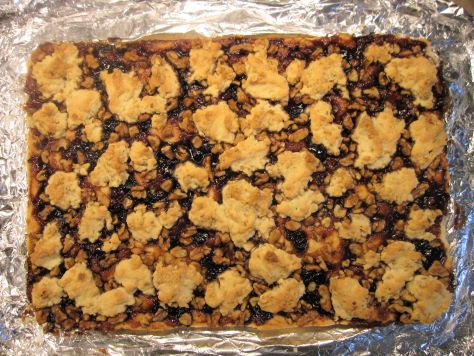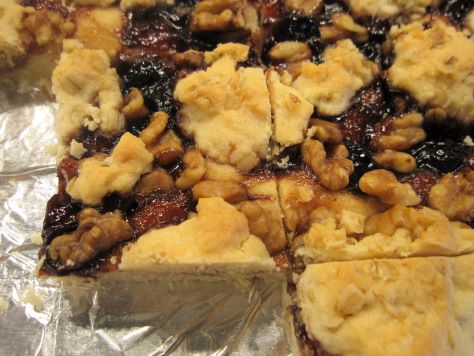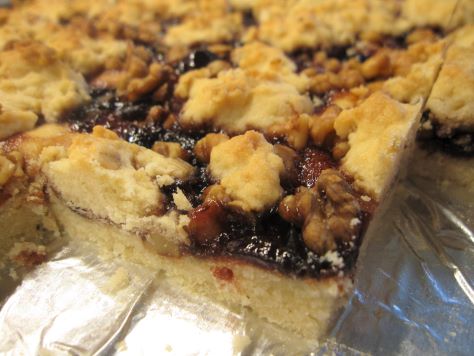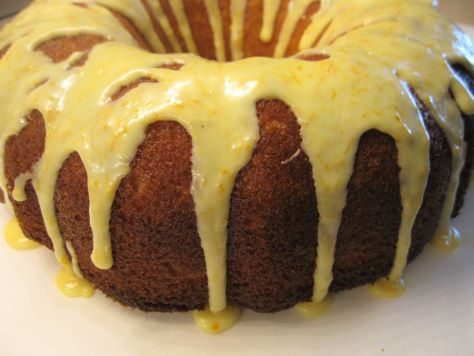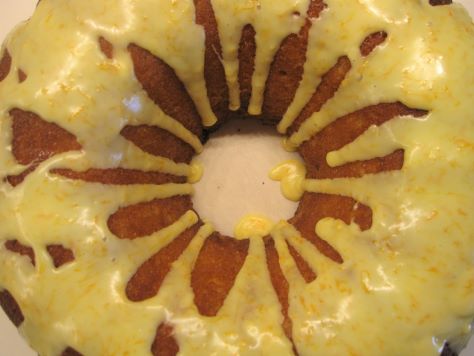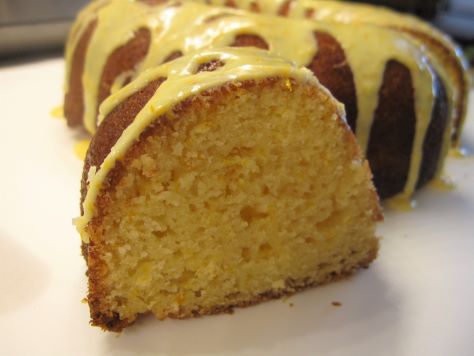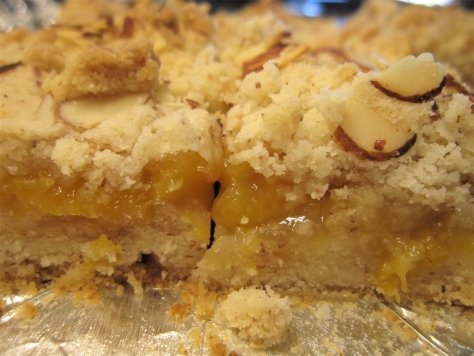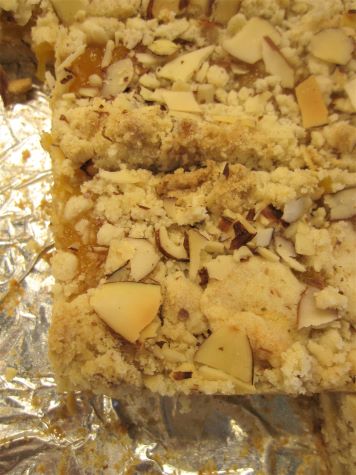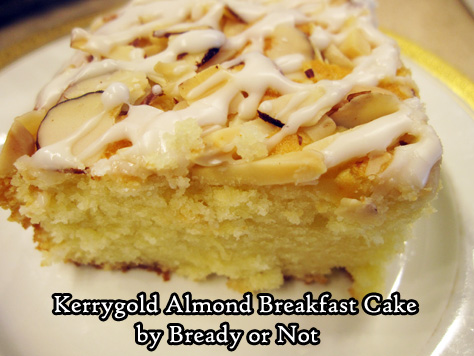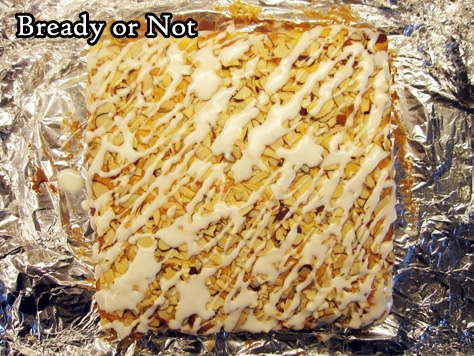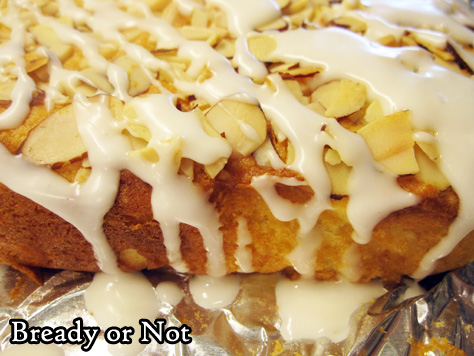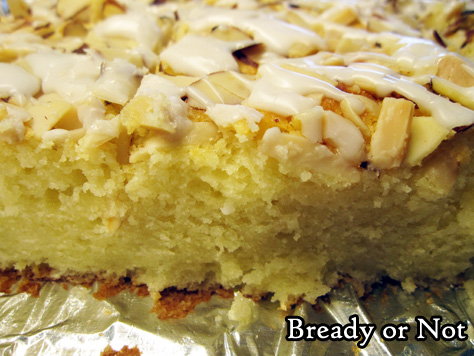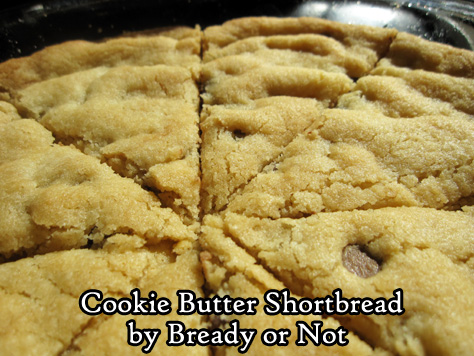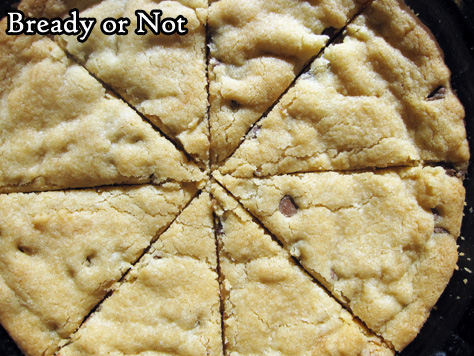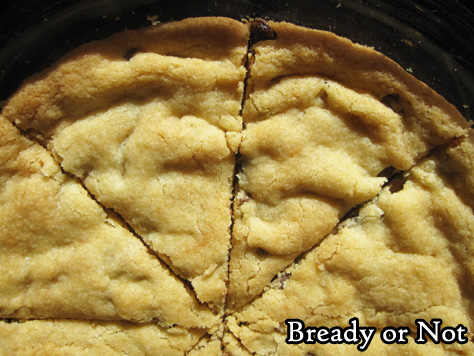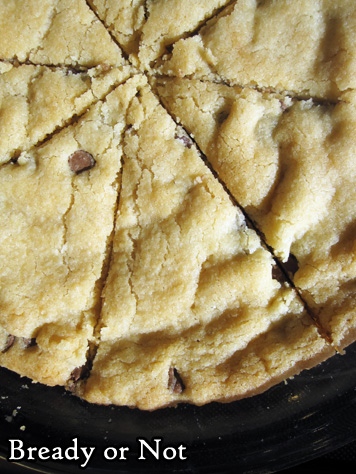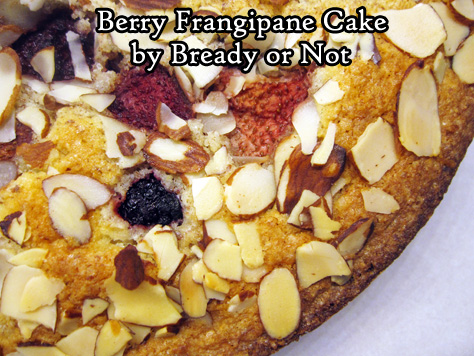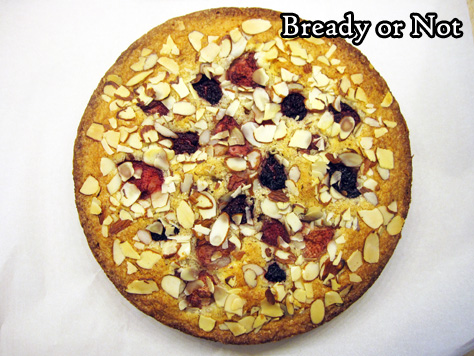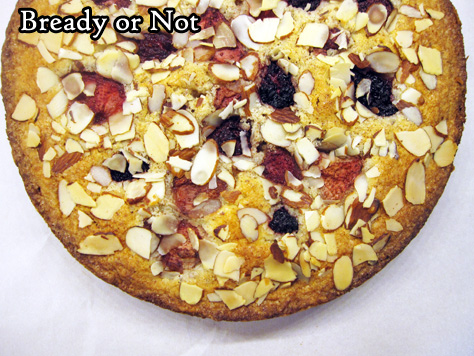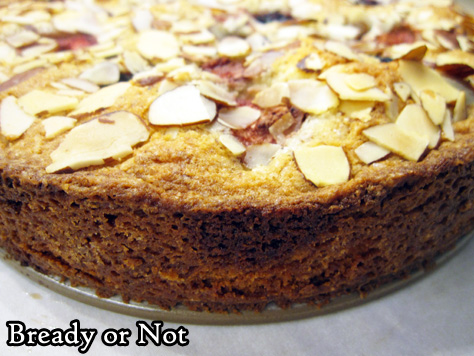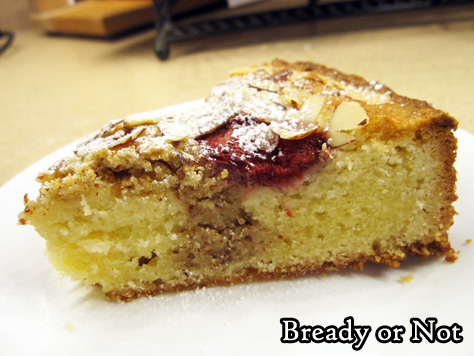Bready or Not Original: Fruity Pastry Bars
These Fruity Pastry Bars are the perfect treat for a crowd. This recipe makes a nice big pan to share with others!
When I make bars like this, I’m always worried about how crumbly they will be. I can report that, at least for me, these were surprisingly durable bars that could even be held in the hand when eating. They barely crumbled when they were cut.
I love how they can be customized, too. You can use all sorts of berry preserves; these pictures depict Bonne Maman Cherry Preserves. The rich, bold flavor is lovely with the buttery crust, while the nuts add a great textural contrast. Of course, you could substitute different nuts like sliced almonds, or omit them entirely.
Bready or Not Original: Fruity Pastry Bars
Equipment
- jelly roll pan
- aluminum foil
- nonstick spray
Ingredients
Bars
- 1 1/2 cup unsalted butter (3 sticks) room temperature
- 1 1/4 cups white sugar
- 2 large eggs room temperature
- 1 teaspoon vanilla extract
- 1 teaspoon salt
- 3 1/2 cups all-purpose flour
Topping
- 12 to 13 ounces fruit preserves such as strawberry, cherry, or raspberry
- 1 cup chopped walnuts
- 1/4 cup quick oats
Instructions
- Line a jelly roll pan with a large piece of aluminum foil. Apply nonstick spray or butter. Preheat oven at 350-degrees.
- In a large bowl, cream together the butter and sugar until light and fluffy. Beat in eggs and vanilla. Gradually mix in the flour and the salt. Batter will be very thick. Grease a hand and use that to pat down about 3/4 of the dough into the bottom of the pan.
- Wash hands. Spread preserves over the dough. Sprinkle the walnuts over the top. Add quick oats to the reserved dough. Place small handfuls of dough spaced out over the top.
- Bake for about 35 minutes, until top is set and doesn’t jiggle in middle. Cool completely, speeding process in fridge if desired. Use foil to lift contents onto a cutting board to slice into bars. Store in a sealed container. Bars can also be frozen for later enjoyment.
OM NOM NOM!
Bready or Not: Sicilian Orange Bundt Cake
If you’re in need of a refreshing summer bundt cake, look no further. This Sicilian Orange Bundt Cake is it.
This is a super-easy cake to make. The ingredients are minimal. It doesn’t make a massive cake. The oranges get used in the cake and in the glaze, so nothing is likely to go to waste.
I love that the orange makes the cake look orange AND taste orange. There is something aesthetically pleasing about that. No surprises, no fake-outs. Orange cake tastes like orange. Got it.
If you have any leftovers, no worries. I found that the cake freezes wonderfully, even glazed. Freeze those extra slices the first day and they’ll taste fresh when you thaw them later!
Modified from Food & Wine September 2020 issue.
Bready or Not: Sicilian Orange Bundt Cake
Equipment
- small bundt cake pan
Ingredients
Cake
- 2 cups all-purpose flour
- 3 large oranges zested and juiced
- 1 1/2 Tablespoons baking powder
- 1 1/2 cups white sugar
- 1/2 cup vegetable oil
- 3 large eggs room temperature
Glaze
- 3/4 cup confectioners’ sugar
- 3 teaspoons orange juice
- orange zest
Instructions
- Preheat oven at 350-degrees. Use a baking spray with flour (or alternatively, some extra vegetable oil and flour) to coat the interior of the bundt pan. Set aside.
- In a small bowl, combine the flour, 2 Tablespoons of orange zest (the rest reserved for the glaze), and baking powder. Set aside.
- In a big mixing bowl, beat together sugar, vegetable oil, and eggs on high speed until it becomes quite pale, about a minute and a half. Add 1 1/4 cups orange juice, beating until combined. Gradually mix in the dry ingredients, scraping bottom of bowl as needed.
- Pour batter into the pan. Bake for 45 minutes, until the middle passes the toothpick test. Cool for about 20 minutes, then invert it onto a rack to completely cool, speeding the process in the fridge if desired.
- Make the glaze. Measure out the sugar. Add orange juice and any remaining zest. If mixture is thick, add a touch more juice; if runny, add more sugar. It should be a thick texture as it is drizzled on the cake. Let glazed cake set at least 30 minutes at room temperature or in fridge before slicing in.
- Cake is great kept sealed at room temperature for up to 3 days. It can also be sliced and frozen, glaze and all, and makes for a delicious treat even weeks later.
OM NOM NOM!
Bready or Not Original: Peach-Almond Bars
These Peach-Almond Bars are peachy-keen, if you ask me! They aren’t super sweet and they really let the flavors of the fruit shine through.
I don’t do a lot with peaches because I live in Arizona and the peaches available here are not the best. There are a lot of things I miss about Central California, and the fresh fruit is a big one. (Oh, don’t start my yearning for strawberries…)
The good news is, you don’t need ripe or especially sweet peaches for this recipe because you add a touch of sugar and cook down the fruit. Lyle’s Golden Syrup is a British ingredient that can be found in the import section of a lot of grocery stores; there is no exact American substitute, but a mix of half light corn syrup and half honey is one I have seen in recipes more than once.
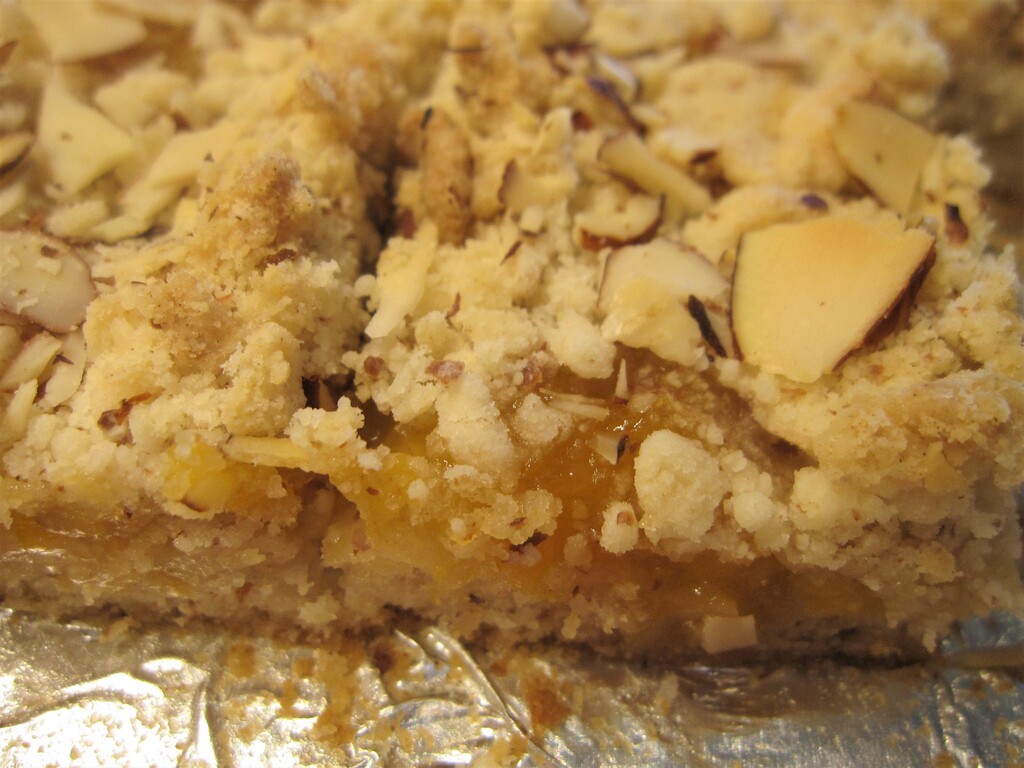
These bars are a pleasant mix of softness, crispness, peachiness, and crunchy almonds. Not only would they make for a good dessert or snack, but a fine breakfast as well.
Bready or Not Original: Peach-Almond Bars
Equipment
- 9×13 pan
- aluminum foil
- nonstick spray
Ingredients
Peaches
- 6 small peaches about 4 cups, peeled and chopped
- 1/4 cup water
- 1/4 cup Lyle’s Golden Syrup
- 1 Tablespoon corn starch
Bars
- 2 cups all-purpose flour
- 1 cup almond flour sifted to remove lumps
- 1 cup confectioners’ sugar
- 1 teaspoon baking powder
- 1/2 teaspoon salt
- 2 sticks unsalted butter (1 cup) room temperature
- 2 Tablespoons sliced almonds
Instructions
- Preheat oven at 350-degrees. Line a 9×13 pan with foil and apply baking spray
- In a medium saucepan, cook the peaches, water, and golden syrup about 15 minutes at a simmer, until peaches are soft. Add corn starch and stir well to bring the liquid together. Let set a few minutes to gel.
- In a mixing bowl, combine flour, almond flour, confectioners’ sugar, baking powder, and salt. Beat in the butter until it forms a lumpy dough.
- Press about 2/3 of dough into the prepared pan. Use a piece of waxed paper and a heavy glass to really compress it. Spread the peach mixture on top. Add clumps of the remaining dough to sporadically cover. Sprinkle almonds on top.
- Bake for about 40 minutes, until middle is set, not jiggly, with a golden brown crust across the top. Cool completely, speeding the process in the fridge if desired. Use foil to lift contents onto a cutting board to slice up. Store in a covered container, with waxed paper between the layers or with bars individually wrapped.
OM NOM NOM!
Bready or Not: Kerrygold Almond Breakfast Cake
This Kerrygold Almond Breakfast Cake is moist, light, and delicious thanks to Irish butter, ricotta cheese, and a vivid spark of lemon.
I found the original version of this recipe on the Kerrygold website and modified it quite a bit to make it work for a square 9-inch pan. I also added a glaze because, well, I thought it needed one–and it does. Not only does it boost the sweetness, but it helps that layer of sliced almonds adhere more.
Using ricotta cheese in a cake like this doesn’t make it taste cheesy. The ricotta adds moisture, creating a soft, tender crumb, and it plays beautifully with the potent Kerrygold butter.
Now, about that Kerrygold. For baking purposes, I like to buy it at Costco when it goes on sale a few times a year. Stash it in the freezer and it keeps for a long, long time. It’s sure more cost-effective than buying it at the grocery store.
This cake is lemony-bright in flavor with a crisp-top crust thanks to the almonds. It keeps at room temperature for a few days or can be frozen for later.
Bready or Not: Kerrygold Almond Breakfast Cake
Equipment
- 9-inch square pan
- aluminum foil
- uneven spatula
Ingredients
Cake
- 1 1/2 cups all-purpose flour
- 2 teaspoons baking powder
- 3/4 teaspoon kosher salt
- 8 Tablespoons Kerrygold unsalted butter (1 stick) 1/2 cup, room temperature
- 1 cup white sugar
- 1 lemon zested and juiced
- 2 large eggs room temperature
- 1 teaspoon pure almond extract
- 1 1/2 cups whole milk ricotta cheese
- 3/4 cup sliced almonds
Glaze
- 3/4 cup confectioners’ sugar
- 3 teaspoons fresh lemon juice
Instructions
- Preheat oven at 350-degrees. Line 9-inch pan with foil extended up all four sides. Apply nonstick spray.
- Whisk together flour, baking powder, and salt. Set aside.
- In a large mixing bowl, beat together butter, sugar, and lemon zest until light and fluffy, about 4 minutes. Add eggs and almond extract.
- To the mixing bowl, alternatively add the flour mixture and the ricotta. Batter will be thick.
- Pour it into the prepared pan. Level off with an uneven spatula. Sprinkle sliced almonds to cover the top.
- Bake for 33 to 38 minutes, until the middle passes the toothpick test.
- Cool in pan for at least 45 minutes, then use foil to lift it onto a rack to completely cool at room temperature.
- Make glaze and drizzle across the top. Let set for 30 minutes before cutting. Cake will keep at least two days at room temperature, or pieces can be individually wrapped and frozen for later.
OM NOM NOM!
Bready or Not Original: Cookie Butter Shortbread
The Cookie Butter Shortbread is a new riff on my classic Shortbread recipe that I’ve also made with espresso powder and chocolate chips–and also with an infusion of lemon and a glaze. It’s a versatile base recipe.
Now, I bet some of you are asking–what is cookie butter? It’s essentially pureed spice cookies with oil, forming a spreadable consistency just like peanut butter. You can find it in stores by the nut butter; Trader Joe’s carries it under the name Speculoos. What cookie butter does is make cookies taste more… cookie. You’ll know what I mean when you try it.
This is not a crisp shortbread like the traditional Walker’s brand (which is delicious in its own right). No, this shortbread is cakey and soft, only crisp at the very edge.
Sometimes the first piece out of the pan can even be fussy and break in half; a metal pie spatula helps, but sometimes it can still happen. That’s no major problem, though, because of every bite of Shortbread is good, even if it’s not perfectly photogenic.
Enjoy this Cookie Butter Shortbread for breakfast or snacks, or in proper fashion at tea time.
Bready or Not Original: Cookie Butter Shortbread
Equipment
- 2 pie plates
Ingredients
- 2 cups all-purpose flour
- 3/4 cup white sugar
- 1/4 teaspoon salt
- 1 cup unsalted butter 2 sticks, softened
- 1 egg yolk
- 1/2 teaspoon vanilla extract
- 1/4 cup creamy cookie butter
- 1/2 cup milk chocolate chips
Instructions
- Preheat oven at 375-degrees. Apply nonstick spray to both pie plates.
- Stir together the flour, sugar, and salt. Add butter, egg yolk, vanilla extract, and cookie butter. Use hands to compress dough together. Add the chocolate chips and mix, bringing dough together again to form a ball. Divide in half, placing one in each pie plate. Flatten dough with palms to create an even surface. Prick surface all over with a fork then use a knife to slash dough into triangular wedges.
- Bake for 18 to 22 minutes, until edges are golden brown and middle is set. Remove from oven and cut again along slash marks. Let shortbread cool completely, then cut again along existing marks.
- Shortbread keeps for several days at room temperature. It can be stored covered in pie plates, or stacked in a sealed container with wax paper between the layers.
OM NOM NOM!
Bready or Not Original: Berry Frangipane Cake
This Berry Frangipane Cake is a lot of work, and it shows! This cake would make for a stunning breakfast, brunch, or dessert.
Frangipane is a kind of pastry filling made from almond flour. It is absolutely delicious, imbuing treats with nuttiness and sweetness.
In this cake, frangipane works alongside cake batter to form the base for a lovely topping of formerly-frozen fruit and sliced almonds. I used a pretty standard fruit mix with raspberries, blackberries, and strawberries, and it’d come from the dollar store.
If you want to use a single frozen fruit or a more select mix, go for it. Just remember that it should be thawed, drained, and patted dry, and if the pieces are very large, they should probably be cut to be around bite-size.
I found that this kept perfectly well in individually-wrapped pieces at room temperature for about 2 days. It was also great to freeze. I had pieces frozen for weeks and then thawed them, and it was impossible to tell they’d ever been in the freezer.
Greatly modified from Bake from Scratch January/February 2021 issue.
Bready or Not Original: Berry Frangipane Cake
Equipment
- 9-inch springform pan
- parchment paper
- offset spatula
- 2 cookie scoops
Ingredients
Frangipane
- 2/3 cup unsalted butter room temperature
- 1 1/2 cups superfine almond flour sifted if thick or clumpy
- 3/4 cup white sugar
- 1/4 cup all-purpose flour
- 1 large egg
- 1 large egg white
- 1 teaspoon kosher salt
- 1 teaspoon almond extract
Batter
- 1/2 cup unsalted butter 1 stick, room temperature
- 3/4 cup white sugar
- 1 large egg room temperature
- 3/4 teaspoon vanilla extract
- 1/4 teaspoon almond extract
- 1 cup all-purpose flour
- 3/4 teaspoon baking powder
- 1/4 teaspoon kosher salt
- 1/4 cup milk or half & half
Fruit topping
- 3/4 cup frozen mixed berries drained, thawed, and patted dry
- 3 Tablespoons sliced almonds
- confectioners' sugar for dusting
Instructions
- Preheat oven at 325-degrees. Cut a piece of parchment to fit the base of a 9-inch springform pan. Spray pan with nonstick spray, place paper cut-out inside, then spray that as well. Set aside.
- Make the frangipane. In a bowl, beat the butter until it’s creamy. Add the rest of the ingredients to combine well. Set aside.
- Make the batter. In a large bowl, beat the butter and sugar until they are fluffy. In a stand mixer, this will be 3 to 4 minutes. Add the egg followed by the extracts,
- In a separate bowl, combine the flour, baking powder, and salt. Gradually add the dry ingredients into the butter-batter alternatively with the milk. Scrape the bottom of the bowl often.
- Scoop about 1 cup of the batter into the pan and even out with an offset spatula. Measure out about 1 cup of the frangipane. Use two spring-loaded cookie scoops (tablespoon or teaspoon-sized, or without those, use a normal tablespoon and get your fingers dirty), scoop from the 1 cup frangipane and the batter to create a checkerboard pattern of dollops atop of base. Continue to alternate in a second layer, using up the rest of the batter as well as the 1 cup frangipane. Use a butter knife to swirl through them to create a slight marbled effect. Tap the pan on the counter a few times to knock out bubbles.
- Use a scoop to place the rest of the frangipane on the top of the cake. Even out with offset spatula. Place the berries atop the frangipane, then sprinkle the almonds all over to coat.
- Bake until the cake has set edges, about 50 minutes to 1 hour. An instant-read thermometer plunged into the middle should read over 202-degrees. Let cool in pan 10 minutes, then release the side clasp. Continue to cool the cake on the metal base until room temperature. Add a sprinkle of confectioners' sugar to pretty it up for serving.
- Cake will keep covered for up to 2 days at room temperature. It can also be individually sliced and frozen for later enjoyment.




